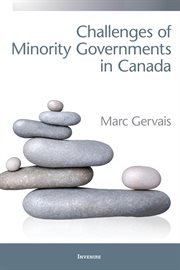Details
PUBLISHED
Made available through hoopla
DESCRIPTION
1 online resource
ISBN/ISSN
LANGUAGE
NOTES
Marc Gervais est titulaire d'un doctorat en sciences politiques de l'Université d'Ottawa et a été directeur des affaires parlementaires pour Innovation, Sciences et Développement économique Canada, dans un cabinet de ministre fédéral pendant une période de gouvernement minoritaire. Il a ensuite travaillé comme directeur exécutif pour le Conseil de recherches en sciences humaines du Canada jusqu'en 2021. Marc Gervais has a Ph. D in political science from the University of Ottawa and was Director of Parliamentary Affairs for Innovation, Science, and Economic Development Canada, in a federal minister's office during a period of minority government. He then worked as Executive Director for the Social Sciences and Humanities Research Council of Canada until 2021. There have been few studies of Canadian minority governments despite the fact that between 1957 and 2008, 9 of the 18 general federal elections produced minority governments. How such governments manage to remain in power (viability) and gain support for their legislative proposals (effectiveness) has not been investigated thoroughly. Three theoretical perspectives (the rational choice tradition, new institutionalism, and the party politics and party systems approach) are used to examine the dynamics at play. Data for four minority governments (Diefenbaker 1957-58, Pearson 1963-65, Clark 1979-80, and Harper 2006-08) have been gathered from archival records, debates and votes in the House of Commons, autobiographies, third party accounts and earlier studies on minority governments. Viability and effectiveness would appear to depend on (1) bargaining power (interparty dynamics and intra-party cohesion) and (2) agenda control (House business, confidence tests and other institutional features). The study also stresses the importance of government concessions, and the capacity and skill of parliamentary actors in using the institutional and party system levers. There have been few studies of Canadian minority governments despite the fact that between 1957 and 2008, 9 of the 18 general federal elections produced minority governments. How such governments manage to remain in power (viability) and gain support for their legislative proposals (effectiveness) has not been investigated thoroughly. Three theoretical perspectives (the rational choice tradition, new institutionalism, and the party politics and party systems approach) are used to examine the dynamics at play. Data for four minority governments (Diefenbaker 1957-58, Pearson 1963-65, Clark 1979-80, and Harper 2006-08) have been gathered from archival records, debates and votes in the House of Commons, autobiographies, third party accounts and earlier studies on minority governments. Viability and effectiveness would appear to depend on (1) bargaining power (interparty dynamics and intra-party cohesion) and (2) agenda control (House business, confidence tests and other institutional features). The study also stresses the importance of government concessions, and the capacity and skill of parliamentary actors in using the institutional and party system levers. There have been few studies of Canadian minority governments despite the fact that between 1957 and 2008, 9 of the 18 general federal elections produced minority governments. How such governments manage to remain in power (viability) and gain support for their legislative proposals (effectiveness) has not been investigated thoroughly. Three theoretical perspectives (the rational choice tradition, new institutionalism, and the party politics and party systems approach) are used to examine the dynamics at play
Mode of access: World Wide Web







